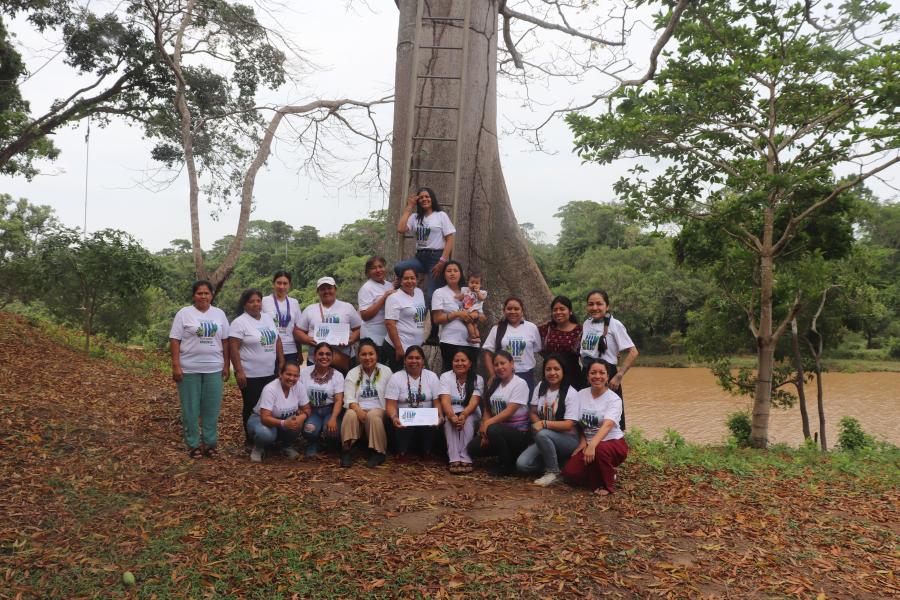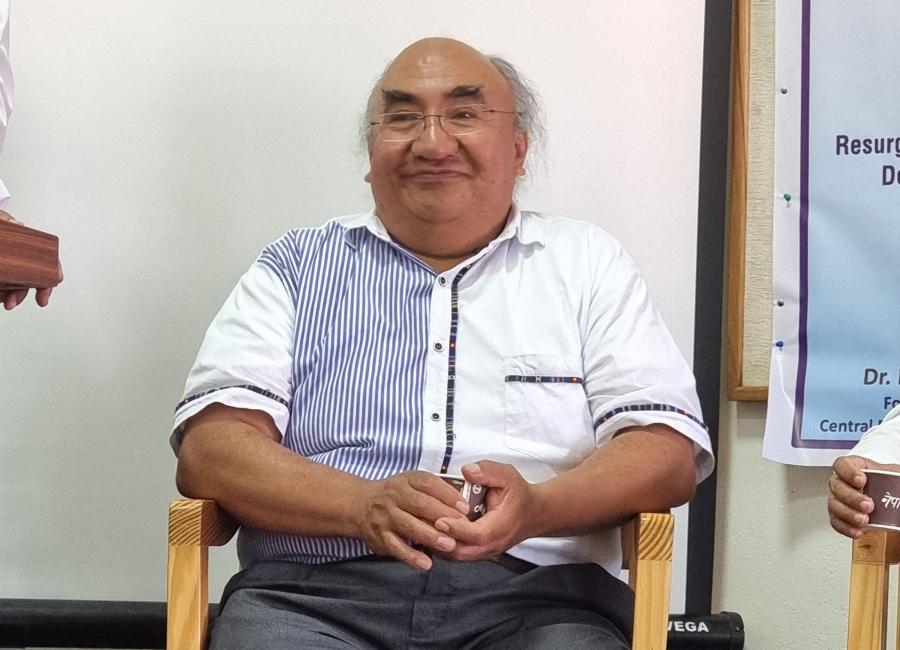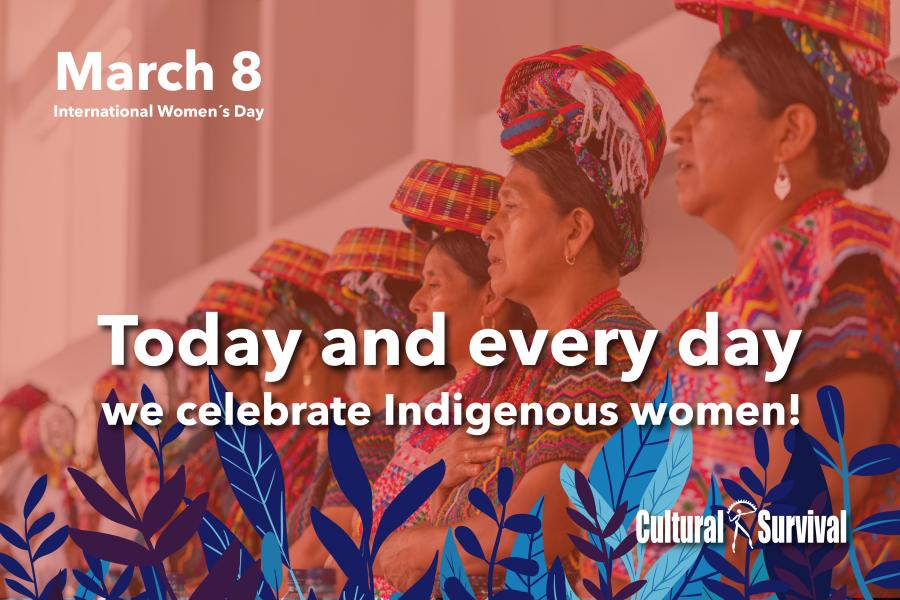We, the indigenous peoples of Abya Yala, reunited within the framework of the Conference of Parties (COP17) of the United Nations Framework Convention on Climate Change facing the lack of political will of states, mainly of the biggest emitters of greenhouse gases and inspired by the harmony with Mother Earth, demand:
General framework:
• Recognize and respect the self determination of indigenous peoples, particularly our rights to territories and natural resources in accordance with the United Nations Declaration on the Rights of Indigenous Peoples.
• To ensure and guarantee the full and effective participation of indigenous peoples at all levels, respecting the processes based on consultation and free, prior and informed consent in accordance with the United Nations Declaration on the Rights of Indigenous Peoples.
• Recognize, respect and strengthen the fundamental contribution of knowledge, innovations and traditional practices of indigenous peoples.
• Restructure the conceptions of the so called "development" based on the accumulation of wealth that emphasize the unlimited exploitation of natural assets.
Shared Vision:
• We urge developed countries to achieve a framework of binding commitments with concrete targets for reducing emissions of greenhouse gases (GHGs) to follow up the Kyoto Protocol which expires in 2012.
We propose an emissions reduction of at least 45% below 1990 levels by 2020 and at 2050 least 95%.
• Phase-out of fossil fuel development and a moratorium on extractive projects, in, or close to, our land and territories, respecting the rights to “Buen Vivir” of indigenous peoples.
• Shared vision for cooperative action in the long run should not be reduced to define the limit in the increase of temperature and concentration of GHG in the atmosphere, on the contrary it should include a comprehensive and balanced set of financial measures, technology, adaptation, capacity building, patterns of production, consumption and other essentials issues such as recognition of the rights of Mother Earth to restore harmony with nature.
Technology transfer:
• Knowledge is universal and can under no circumstances be owned and for private use, nor its application in the form of technologies. Developed countries should share their technology with developing countries.
• The transfer and installation of technologies must be immediate, timely and free of charge, in harmony with Mother Earth and without conditions, including technology that is patented and undisclosed information.
• The system of intellectual property rights should be modified to ensure access to clean technologies for mitigation and adaptation, especially those developed partly with public funds, considering the 45 recommendations adopted in the framework of the Development Agenda of the General Assembly of the World Intellectual Property Organization. It must include prior and informed consent and equitable benefit sharing.
• Establish guidelines for creating a multilateral, multidisciplinary approach to participatory control, management and ongoing evaluation of the exchange of technologies. These technologies should be useful, clean and socially appropriate.
• Establish a fund for financing and appropriate technology inventory and freed from intellectual property rights, including patent monopolies should move from private to public domain, freely accessible and low cost.
• Any assessment, recovery and development of mitigation and adaptation must reflect the knowledge and indigenous technologies, subject to their free, prior and informed, consent .
Adaptation and mitigation:
Ensure the respect, protection and promotion of traditional knowledge and sustainable livelihoods of indigenous peoples. Include environmental and social safeguards of indigenous peoples, including cultural and spiritual aspects.
• Policies and public funds that prioritize comprehensive territorial recognition of indigenous peoples. Recognize and promote the own systems of indigenous peoples in the use, management and conservation of natural assets.
• System of monitoring, reporting and verification should not only measure changes in forest cover but incorporate social variables, in particular regarding the implementation of indigenous rights.
• Any assessment, recovery and development of mitigation and adaptation action must reflect the knowledge and technology of indigenous peoples, and be subject to their prior, free and informed consent, as well as ensure participation of indigenous experts.
• We demand that the Permanent Forum on Indigenous Issues recommend to the UN Office of the United Nations Special Rapporteur on the Rights of Indigenous Peoples (United Nations Special Rapporteur on human rights and fundamental freedoms of indigenous peoples) to produce a report on the impacts of climate change in the Indigenous Peoples.
• States should ensure that indigenous peoples have the right to mobility and are not forced to relocation from their traditional lands and territories, and that the rights of peoples in voluntary isolation are respected.
• In the case of climate change migrants, programs and appropriate measures should be commensurate with their rights, status, conditions and vulnerabilities.
Funding:
• All funding mechanisms for mitigation and adaptation to climate change should be established under the UN Framework Convention for Climate Change and direct resources should be provided to indigenous peoples.
• Establish participatory mechanisms to ensure transparency and accountability in all procedures and funding operations. The funds must come from public sources and be additional to development aid funds.
• Establish a special fund to enable indigenous and local communities develop their own activities and contributions to remedy climate change.
• Developed countries must commit new annual funding of at least 6% of its gross domestic product to address climate change in developing countries.
• Funding should be direct, unconditional and non-infringement of national sovereignty or self-determination of communities and the most affected groups.
• International financial institutions like the World Bank should be exempt from the administration of the funds created and established. They fund projects that contribute to global warming and more so now that the World Bank aims to eliminate safeguards for indigenous peoples through the "Program for Results" – P4R .
• The developed countries, that are the major reason of climate change, should assume their historical and current responsibility, must recognize and honor their climate debt in all its dimensions as a basis for a just, effective and scientific climate change.
• In the context of climate debt, we urge developed countries to restore developing countries the atmospheric space that is occupied by their GHG emissions.
Carbon markets and related mechanisms:
• We challenge States to abandon the false solutions to climate change that negatively impact on our rights, land, air, oceans, forests, lands and waters as indigenous peoples. These false solutions include nuclear energy, hydroelectric dams, massive geo-engineering techniques, "clean coal," agrofuels plantations, carbon market mechanisms, and the Clean Development Mechanisms.
• The solutions proposed by governments and international NGOs to address the effects of climate change based on market logic, both referring to the clean development mechanism as the proposed REDD +, are new forms of geopolitical economic that threaten indigenous peoples rights guaranteed in multiple international instruments and the livelihoods of our people.
• A structural reorganization of REDD + to ensure the rights of indigenous peoples and customary governance of forests. Identification of and curb the "carbon cowboys" and as the piracy of carbon is the result of the inconsistencies of REDD +, it must be restructured deeply, prioritizing public mechanisms and transparent funding, not subordinated to the evils of the financial bubble of the private market carbon credits; priority to consolidation of the territorial rights of indigenous peoples and their life plans without reducing the bias of "additionality of carbon."
Durban, South Africa, November 30, 2011.
Indigenous Peoples Forum on Climate Yala Abya



